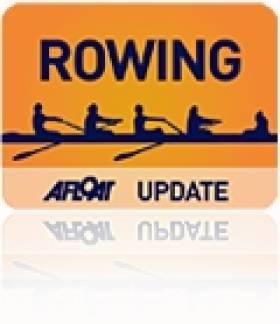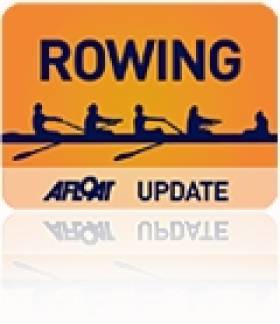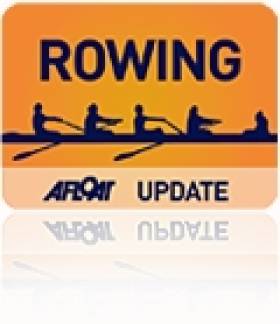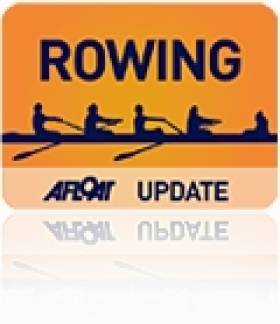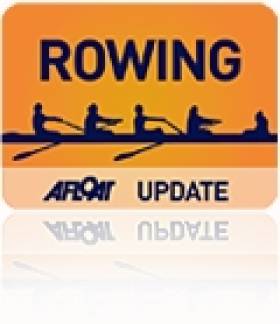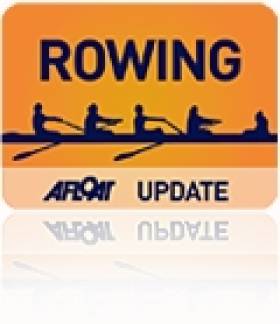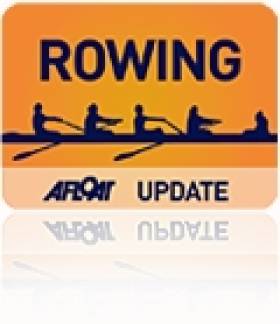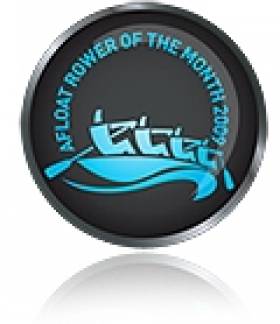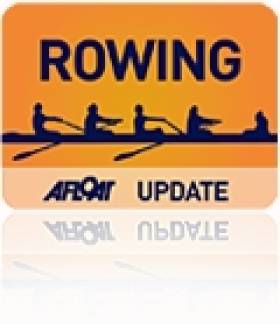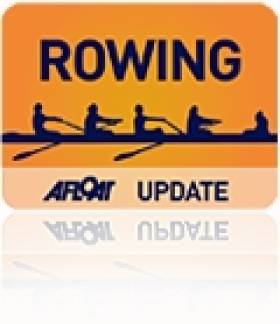Displaying items by tag: Lucerne
Ireland Lightweight Pair Make A Final
#Rowing: The new Ireland lightweight pair of Mark O’Donovan and Shane O’Driscoll will compete in the A Final at the World Cup regatta in Lucerne. The two Corkmen finished fourth in their repechage to take their place in the top six overall.
Denise Walsh would have had to finish in the top two of her repechage to take her place in the A Final of the lightweight single sculls. She missed out by one place, and will compete in the B Final.
World Cup Regatta, Lucerne – Day One (Irish interest; selected results)
Men
Lightweight Pair – Repechage (First Four to A Final): 4 Ireland (M O’Donovan, S O’Driscoll) 6:50.28.
Women
Lightweight Single – Repechage One (Two to A Final; rest to B Final): 3 Ireland (D Walsh) 8:11.47.
Three Ireland Crews Win Repechages to Make World Cup Semis
#Rowing: Three Ireland crews won their repechages at the World Cup Regatta in Lucerne today. Sanita Puspure in the single scull and the women’s double (Helen Hannigan and Lisa Dilleen) and lightweight double (Sinead Jennings and Claire Lambe) all grabbed their chances to qualify for the A/B Semi-Finals.
The women’s pair of Monika Dukarska and Leonora Kennedy and the lightweight men’s double of Paul and Gary O’Donovan did not make the semi-finals. Dukarska and Kennedy finished fifth in their repechage and the men’s crew took the same place in their quarter-final.
World Cup Regatta, Lucerne – Day One (Irish interest; selected results)
Men
Lightweight Pair – Heat One (First Directly to A Final; rest to repechages): 1 France 6:45.55; 2 Ireland (M O’Donovan, S O’Driscoll) 6:56.04
Lightweight Double Sculls – Heat Five (First Three Directly to Quarter-Finals): 1 Norway 6:17.32, 2 Ireland (G O’Donovan, P O’Driscoll) 6:20.20, 3 Portugal 6:21.09. Quarter Final (First Three to A/B Semi): 5 Ireland 6:18.69.
Women
Pair – Heat Three (First Two Directly to A/B Semi-Finals; rest to repechages): 1 Denmark 7:09.27, 2 South Africa 7:16.71; 6 Ireland (L Kennedy, M Dukarska) 7:44.68. Repechage: 5 Ireland 7:19.92.
Double Sculls – Heat Two (First Two Directly to A/B Semi-Finals; rest to repechage): 1 New Zealand 6:51.71, 2 Greece 6:53.20, 3 Ireland (H Hannigan, L Dilleen) 6:56.65. Repechage One (First Three to A/B Semis): 1 Ireland 6:56.38.
Lightweight Double Sculls – Heat One (First directly to A/B Semi-Finals; rest to repechages): 1 South Africa 6:54.01; 2 Ireland (C Lambe, S Jennings) 6:57.98. Repechage Four: 1 Ireland 7:00.87.
Single Sculls – Heat One (First directly to A/B Semi-Finals; rest to repechages): 1 Australia (K Crow) 7:30.62; 2 Ireland (S Puspure) 7:38.60. Repechage (First Two to A/B Semis): 1 Ireland 7:36.39.
Lightweight Single Sculls – Heat Two (First directly to A Final; rest to repechages): 1 New Zealand (Z McBride) 7:32.88; 3 Ireland (D Walsh) 7:57.67.
Puspure Second in Heat at World Cup in Lucerne
#Rowing: Sanita Puspure took second place in her heat of the women’s single sculls at the World Cup regatta in Lucerne. There was just one qualification place on offer, and this was taken with aplomb by Kim Crow of Australia. Puspure was the one other competitor who put any pressure on Crow, but the in-form sculler had a clearwater lead down the course and won by over eight seconds.
Denise Walsh finsihed third in her heat of the lightweight single sculls. The race was won in stunning fashion by Zoe McBride of New Zealand, and she took the one qualification place for the A Final.
World Cup Regatta, Lucerne – Day One (Irish interest; selected results)
Men
Lightweight Pair – Heat One (First Directly to A Final; rest to repechages): 1 France 6:45.55; 2 Ireland (M O’Donovan, S O’Driscoll) 6:56.04
Lightweight Double Sculls – Heat Five (First Three Directly to Quarter-Finals): 1 Norway 6:17.32, 2 Ireland (G O’Donovan, P O’Driscoll) 6:20.20, 3 Portugal 6:21.09.
Women
Pair – Heat Three (First Two Directly to A/B Semi-Finals; rest to repechages): 1 Denmark 7:09.27, 2 South Africa 7:16.71; 6 Ireland (L Kennedy, M Dukarska) 7:44.68
Double Sculls – Heat Two (First Two Directly to A/B Semi-Finals; rest to repechage): 1 New Zealand 6:51.71, 2 Greece 6:53.20, 3 Ireland (H Hannigan, L Dilleen) 6:56.65
Lightweight Double Sculls – Heat One (First directly to A/B Semi-Finals; rest to repechages): 1 South Africa 6:54.01; 2 Ireland (C Lambe, S Jennings) 6:57.98
Single Sculls – Heat One (First directly to A/B Semi-Finals; rest to repechages): 1 Australia (K Crow) 7:30.62; 2 Ireland (S Puspure) 7:38.60
Lightweight Single Sculls – Heat Two (First directly to A Final; rest to repechages): 1 New Zealand (Z McBride) 7:32.88; 3 Ireland (D Walsh) 7:57.67.
Dilleen and Hannigan Show Fighting Spirit in Lucerne
# Rowing: Helen Hannigan and Lisa Dilleen showed fighting spirit in their heat of the double sculls at the World Cup Regatta in Lucerne in Switzerland. There were just two direct qualification places on offer in their heat: New Zealand and Greece zipped into the lead and held off all the challengers. Ireland and Austria chased them, but only Dilleen and Hannigan kept up the fight. They finished third, 3.25 seconds behind Greece, and are now set to compete in a repechage.
World Cup Regatta, Lucerne – Day One (Irish interest; selected results)
Men
Lightweight Pair – Heat One (First Directly to A Final; rest to repechages): 1 France 6:45.55; 2 Ireland (M O’Donovan, S O’Driscoll) 6:56.04
Lightweight Double Sculls – Heat Five (First Three Directly to Quarter-Finals): 1 Norway 6:17.32, 2 Ireland (G O’Donovan, P O’Driscoll) 6:20.20, 3 Portugal 6:21.09.
Women
Pair – Heat Three (First Two Directly to A/B Semi-Finals; rest to repechages): 1 Denmark 7:09.27, 2 South Africa 7:16.71; 6 Ireland (L Kennedy, M Dukarska) 7:44.68
Double Sculls – Heat Two (First Two Directly to A/B Semi-Finals; rest to repechage): 1 New Zealand 6:51.71, 2 Greece 6:53.20, 3 Ireland (H Hannigan, L Dilleen) 6:56.65
Lightweight Double Sculls – Heat One (First directly to A/B Semi-Finals; rest to repechages): 1 South Africa 6:54.01; 2 Ireland (C Lambe, S Jennings) 6:57.98
#Rowing: Gary and Paul O’Donovan qualified for the quarter-finals of the World Cup regatta in Lucerne with a second-place finish in their heat of the lightweight double sculls. Norway won well and Ireland took over ahead of Portugal in the final quarter and held off a push by the Portuguese.
Sinéad Jennings and Claire Lambe had just one qualification place, for the semi-finals, on offer in their heat of the lightweight double. South Africa held off Ireland and Denmark at the head of the field, with Ireland testing the eventual winners.
World Cup Regatta, Lucerne – Day One (Irish interest; selected results)
Men
Lightweight Pair – Heat One (First Directly to A Final; rest to repechages): 1 France 6:45.55; 2 Ireland (M O’Donovan, S O’Driscoll) 6:56.04
Lightweight Double Sculls – Heat Five (First Three Directly to Quarter-Finals): 1 Norway 6:17.32, 2 Ireland (G O’Donovan, P O’Driscoll) 6:20.20, 3 Portugal 6:21.09.
Women
Pair – Heat Three (First Two Directly to A/B Semi-Finals; rest to repechages): 1 Denmark 7:09.27, 2 South Africa 7:16.71; 6 Ireland (L Kennedy, M Dukarska) 7:44.68
Lightweight Double Sculls – Heat One (First directly to A/B Semi-Finals; rest to repechages): 1 South Africa 6:54.01; 2 Ireland (C Lambe, S Jennings) 6:57.98
O'Donovan and O'Driscoll Start Well at World Cup in Lucerne
#Rowing: Ireland’s Mark O’Donovan and Shane O’Driscoll had an encouraging start in their heat of the lightweight pair at the World Cup regatta in Lucerne this morning. The two Corkmen finished second to the fast France crew, which dominated the race and took the one A Final qualification place on offer. Ireland go to a repechage.
In the women’s pair, Monika Dukarska and Leonora Kennedy are also bound for a repechage. The two direct qualification places for the semi-final were taken by Denmark, who were impressive winners, and South Africa. Kennedy and Dukarska held fourth and fifth through much of the race and finished sixth.
World Cup Regatta, Lucerne – Day One (Irish interest; selected results)
Men
Lightweight Pair – Heat One (First Directly to A Final; rest to repechages): 1 France 6:45.55; 2 Ireland (M O’Donovan, S O’Driscoll) 6:56.04
Women
Pair – Heat Three (First Two Directly to A/B Semi-Finals; rest to repechages): 1 Denmark 7:09.27, 2 South Africa 7:16.71; 6 Ireland (L Kennedy, M Dukarska) 7:44.68
Big Weekend for Irish Rowing at Home and in Lucerne
#ROWING: It is a big weekend in Irish rowing, both at home and abroad. The Ireland team travel to Switzerland today to compete in the third and final World Cup Regatta of 2015. The races will be held on Lucerne's Rotsee regatta course from 10th-12th July, the same three days that the annual Irish Rowing Championships take place at home at the National Rowing Centre, Cork.
Sanita Puspure could win a medal at Lucerne, racing in the women’s single sculls, and the rising lightweight men’s double of Paul and Gary O’Donovan are contenders for at least an A Final place. Former world champion Sinéad Jennings teams up with Claire Lambe in the lightweight women’s double. All are Olympic-class crews.
This year’s Irish Rowing Championships features the largest entry ever recorded, with 893 crews entered for the Regatta. Races will run from 9am-5pm on Friday, 8:30am-6:30pm on Saturday and 8:30am-5pm on Sunday. The Championships is the premier domestic event of the rowing season and is expected to attract over 10,000 spectators across the three day duration of the competition. Over 3,000 competitors are making the journey to the NRC with the hopes of returning home with a title.
The senior eights event is one of the most anticipated of the weekend, as Trinity, who reached the second round at Henley Royal Regatta, face defending champions NUIG/Gráinne Mhaol and a UCD/Old Collegians composite. John Keohane is current holder of the men’s single sculls title, and a win this year will be three in a row for the Lee Valley rower.
Afloat Rower of the Month is World Rowing Finalist Sanita Puspure
#ROWING: The Afloat Rower of the Month for August is Sanita Puspure. The Old Collegians oarswoman took fourth place at the World Rowing Championships in Amsterdam in the single sculls, just outside the medals in this elite discipline. She had won her heat, placed second in the quarter-final and third in a semi-final where conditions were very difficult.
The performance topped off an outstanding season for this gritty competitor. She started her run with silver medals on both days of the Memorial Paolo d’Aloja regatta in Italy in April. She took a bronze medal at the European Championships – a breakthrough for an Ireland heavyweight woman – and then made the A Final at the World Cup regatta in Aiguebelette, and won the B Final at Lucerne.
Rower of the Month awards: The judging panel is made up of Liam Gorman, rowing correspondent of The Irish Times and David O'Brien, Editor of Afloat magazine. Monthly awards for achievements during the year will appear on afloat.ie and the overall national award will be presented to the person or crew who, in the judges' opinion, achieved the most notable results in, or made the most significant contribution to rowing during 2014. Keep a monthly eye on progress and watch our 2014 champions list grow.
Puspure Fourth in Lucerne Rowing Semi-Final
#ROWING: Sanita Puspure missed out on an A Final place at the World Cup regatta in Lucerne today. Puspure needed to make the top three in her semi-final, but in a race dominated by Emma Twigg of New Zealand, Puspure could only finish fourth. Olympic champion Mirka Knapkova of the Czech Republic took second, and British sculler Victoria Thornley a clear third. Thornley was in the British women’s double at the last World Cup regatta, in Aiguebelette.
World Cup Regatta, Lucerne, Day Two (Selected Results; Irish interest)
Pair – Repechage: Ireland (L Kennedy, L Dilleen) withdrew.
Single Sculls – Semi-Final Two (First Three to A Final; rest to B Final): 1 New Zealand (E Twigg) 7:30.370, 2 Czech Republic (M Knapkova) 7:32.65, 3 Britain (V Thornley) 7:33.21; 4 Ireland (S Puspure) 7:34.910, 5 Italy 7:43.61, 6 Russia 7:43.76.
Ireland Pair Withdraws From World Cup Rowing
#ROWING: The Ireland women’s pair of Leonora Kennedy and Lisa Dilleen pulled out of the repechage at the World Cup in Lucerne today because of injury. The race gave them a chance to qualify directly for the A Final, but Kennedy has a sore back and, according to Ireland high performance director Morten Espersen, it would have been unwise for her to compete.


























